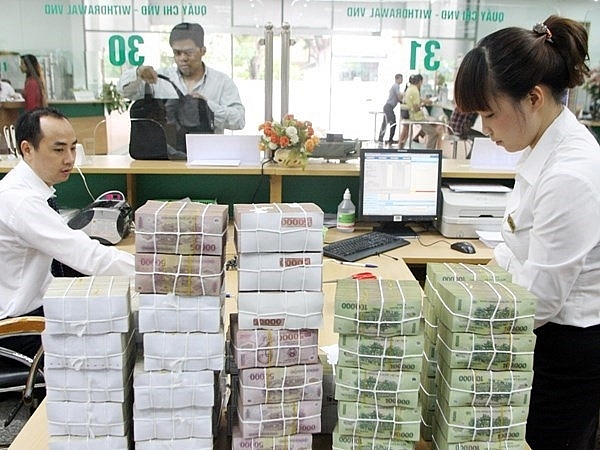 |
|
|
Minister of Finance Dinh Tien Dung last week told the 14th National Assembly’s (NA) ninth session, which was rounded off last week, that under his ministry’s (MoF) latest statistics, the nation will surely not go far from the permissible limit of public debt of 65 per cent strictly set by the legislature in late last year.
The MoF estimated that in this year, if the country’s GDP grows 4.5 per cent, the fiscal deficit will be about 4.73 per cent of GDP, or VND75 trillion ($3.26 billion), resulting in a public debt level of 55.5 per cent of GDP.
In the case that the economy grows 3.6 per cent, the state budget will suffer from a deficit of 5.02 per cent of GDP, or VND90 trillion ($3.9 billion), leading to a public debt level of 56.4 per cent of GDP. The government is considering a plan to borrow more loans from international organisations.
“However, with these two economic growth scenarios, it is expected that the average fiscal deficit for the past five years will be lower than 3.9 per cent of GDP, and the public debt will also be less than 65 per cent which is a limit earlier set by the NA,” Minister Dung stated.
The main reason behind this fiscal deficit is, he explained, the government’s policy to support enterprises and people hit by COVID-19.
“We have been applying exemptions, reductions, and extensions of assorted taxes, charges, and fees. For example, we offer a five-month extension of corporate income tax (CIT) and land rental to enterprises and business households,” Dung said.
“We have also been giving an import tax exemption for healthcare items and materials used for fighting the pandemic, and goods and materials used for producing footwear, textiles and garments, and processing agro-fishery products, mechanics, supporting industries, and automobile manufacturing.”
Last week, the NA also adopted a resolution for reducing 30 per cent of CIT for micro-sized and small-sized enterprises from now until the year’s end. Besides that, the NA Standing Committee will likely allow the 30 per cent reduction in fuel for aviation businesses with aircraft. The government will also offer a 50 per cent reduction in registration fees for domestically-manufactured and assembled automobiles until late 2020.
Notably, the government will use over VND700 trillion ($30.4 billion), which is 2.2 times higher than VND312 trillion ($13.56 billion) of last year, for public investment which is now required to become a strong pillar for economic growth and job creation.
About VND31.1 trillion ($1.35 billion) was disbursed in May, up 17.5 per cent on-year. In the first five months, the figure was VND116.3 trillion (over $5 billion), up 15.6 per cent on-year.
Over the past few months, the government has been deploying some sturdy solutions to support enterprises. Specifically, the State Bank of Vietnam has been deploying a package worth over VND300 trillion ($13 billion) for enterprises and households in the form of debt payment deferral and preferential loans.
The MoF has been carrying out a VND180 trillion ($7.82 billion) credit package to support people and enterprises. Also, the government has been implementing a VND62 trillion ($2.7 billion) package to support poor and unemployed people. The government has also been using about VND3.4 trillion ($147.8 million) to deploy measures against COVID-19 within this year.
In the first five months of 2020, total state budget revenue was estimated to be VND577 trillion (over $25 billion), down 9.2 per cent on-year, while total state budget spending reached VND603.4 trillion ($26.23 billion), up 9.1 per cent on-year. This means a $1.23 billion in budget deficit in the period.
The legislative body last November adopted a resolution on the state budget for 2020, with total revenue of over VND1.51 quadrillion ($65.65 billion), and total state budget expenditure of nearly VND1.75 quadrillion ($76 billion). Total budget deficit will be VND234.8 trillion ($10.35 billion), equivalent to 3.44 per cent of GDP. Of which, the central budget deficit will be VND217.8 trillion ($9.47 billion) or 3.2 per cent of GDP, and the local budget deficit will be VND17 trillion ($880 million) or 0.24 per cent of GDP. VIR
Khoi Nguyen

Vietnam's public debt payment at safe levels after pandemic
The ratio of public debt to GDP is not too high, but the pressure of debt repayment in both VND and foreign currencies will increase in 2020-2021.

Restructuring, bad debts prevent VN banks from paying dividends
At Sacombank’s annual general meeting held on June 5 its permanent vice chairman Pham Van Phong said that in 2019 the bank’s pre-tax profit increased by 43.2 per cent to VND3.2 trillion (US$137.5 million), which was 21.4 per cent above the target.